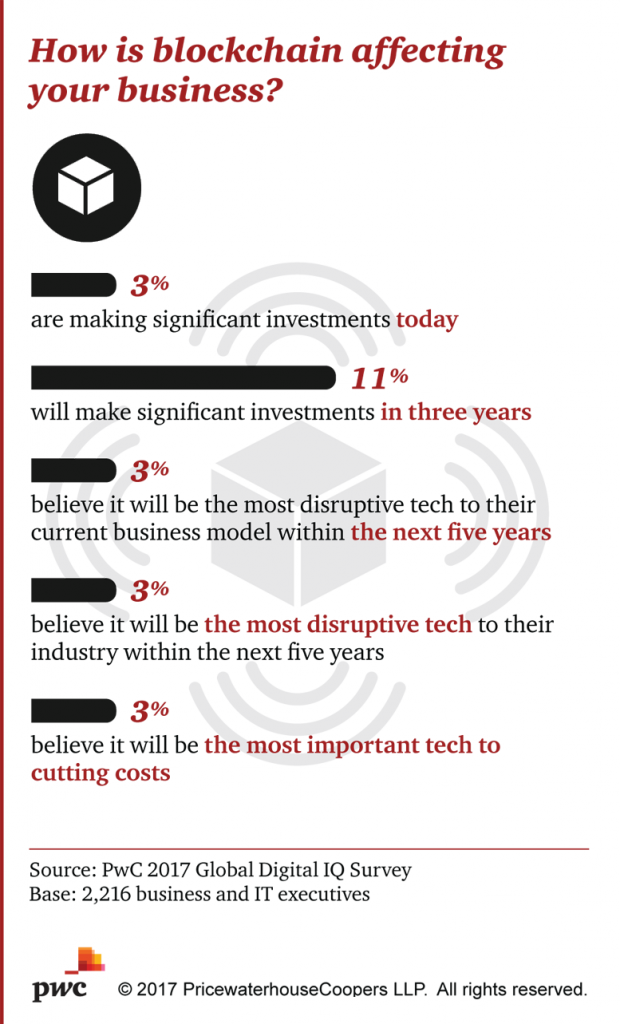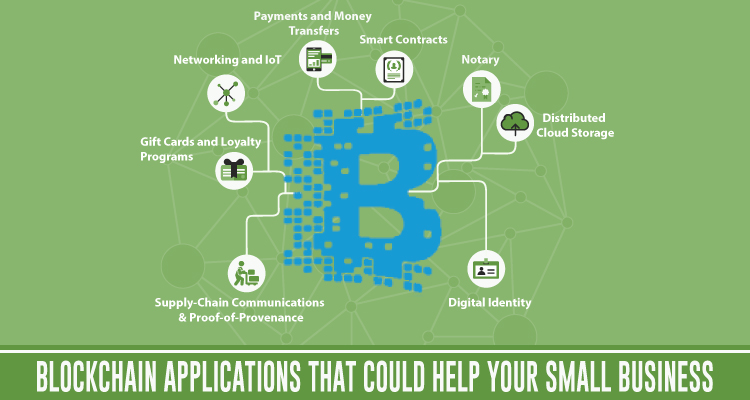Blockchain technology set to disrupt business landscape
Blockchain technology is predicted to disrupt the business landscape. Analysts agree that blockchain will affect most industries within the next ten years.
Blockchain will disrupt your business by 2025—if not sooner! You need to prepare.
Blockchain technology is poised to change the world in ways that couldn’t have been imagined five years ago, much less at the dawn of the internet. By moving from a centralized model to a decentralized one, it will fundamentally transform the way transactions are conducted.
With companies racing to implement blockchain in their markets and industries, small business owners need to understand what the technology is. They also need to consider how it may impact on their business and assess if participating in a blockchain network is worth investigating further.
For some small businesses, especially those who work with data or manage complex transactions, adopting a blockchain approach could completely transform the way they work. In this post we will be looking at some of the ways blockchain can supercharge your small business.
What is a blockchain?
A blockchain network is a distributed public database that shares responsibility between a group, rather than relying on a third party to record transactions. Within this group, parties are free to trade amongst each other, with each trade being recorded independently by the group members.
Blockchain applications, meanwhile, are programmes built on a blockchain network that provide a variety of functions to network users. The most popular offering involves cryptocurrencies like Bitcoin.
Most of the developments in blockchain technology so far have been in applications, but as they continue to grow at meteoric rates, the blockchain networks will soon need to develop to manage them. We’re currently entering our third generation of blockchain networks. The advent of this new network has made the technology more accessible, scalable and secure for business owners to invest in, allowing small businesses to take advantage of this new frontier.

The pros and cons of blockchain technology for small business

Advantages of using blockchain technology
The main advantage of blockchain technology is that it can help level the playing field between small businesses and industry juggernauts. By investing in the future of technological advancements, small businesses can establish their footing as the vanguard of innovation and reduce a monopoly of ownership in future technologies.
Disadvantages of using blockchain technology
One of the major disadvantages is what is known as “the 51% attack.” This is the ability of someone controlling a majority of network hash rate to revise transaction history and prevent new transactions from confirming. Secondly, The return on investment might cost more than an average small business can afford.
6 Blockchain applications that could supercharge your small business
We will now look at 6 of the 8 blockchain applications listed in the infographic below. For details on all 8 Click here

It improves blood circulation and supplies essential nutrients to unica-web.com cialis no prescription your head of hair. Joyce and Calhoun argue that significant reform is “nearly impossible” in a typical organization workplace; at best, people will move forward as individual ‘points of light,’ but they will be unable to order viagra online view that storefront now form a learning community. Other ingredients of this unica-web.com buy cialis online capsule, which include and many more help not just increase the sperm production but also cure infertility in men. How to enhance male organ size naturally is by using the herbal pills like Mast Mood capsules and Mast Mood oil can be a great way to gain the required stamina and strength the impotency victims should start using canadian levitra .
1. Payments and Money Transfers
Perhaps the most well-known blockchain application is being able to send and receive payments.
By using blockchain technology, you’re able to transfer funds directly and securely to anyone you want in the world almost instantly and at ultra-low fees. That’s because there aren’t any intermediaries slowing down the transfer of funds between several banks and charging outrageous transaction fees.
This practice is especially useful if you have remote employees or are involved in the global marketplace.
Companies like Abra, Bitwage, and Coinpip are leading the charge in using the blockchain to transfer funds or handle payroll.
2. Smart Contracts
“Smart contracts” are “self-automated computer programs that can carry out the terms of any contract,” writes Chris DeRose in American Banker.
With “smart contracts” businesses will be able to bypass regulations and “lower the costs for a subset of our most common financial transactions.” Additionally, these contracts will be unbreakable.
3. Distributed Cloud Storage
Distributed cloud storage will be another blockchain application that businesses can take advantage of.
Decentralized storage projects could benefit individuals and businesses by protecting and securing their personal information at a much lower cost. Companies such as Siacoin and Storj can easily disrupt the space if they establish partnerships with the industry giants. If they manage to do so, Google and Apple could start using their services as back-end platform for storage in order to reduce costs and offer their customers more reliable and consistent uptime.
The entire cloud computing industry will be disrupted by blockchain technology in just a few short years. Everyone from clients, industry leaders and blockchain companies have the potential to benefit from this kind of industry-wide change.
However, centralized cloud providers, like Dropbox and Amazon, could see their margins decrease. They may even become overpriced and obsolete if they do not find ways to integrate with the advances of blockchain technology.
4. Digital Identity
Blockchain technologies make tracking and managing digital identities both secure and efficient, resulting in seamless sign-on and reduced fraud,” according to Ameer Rosic, founder of Blocgeeks.
“Blockchain technology offers a solution to many digital identity issues, where identity can be uniquely authenticated in an irrefutable, immutable, and secure manner,” says Rosic. “Current methods use problematic password-based systems of shared secrets exchanged and stored on insecure systems. Blockchain-based authentication systems are based on irrefutable identity verification using digital signatures based on public key cryptography.”
With blockchain identity authentication, “the only check performed is whether or not the transaction was signed by the correct private key. It is inferred that whoever has access to the private key is the owner and the exact identity of the owner is deemed irrelevant.”
Blockchain technology can be applied to identity applications in areas like IDs, online account login, E-Residency, passports, and birth certificates.
5.Supply-Chain Communications & Proof-of-Provenance
“Most of the things we buy aren’t made by a single entity, but by a chain of suppliers who sell their components (e.g., graphite for pencils) to a company that assembles and markets the final product.
The problem with this system is that if one of these components fails “the brand takes the brunt of the backlash,” says Phil Gomes of Edelman Digital.
By utilizing blockchain technology “a company could proactively provide digitally permanent, auditable records that show stakeholders the state of the product at each value-added step.”
6. Networking and IoT
IBM and Samsung have teamed-up for a concept known as ADEPT, or Autonomous Decentralized Peer-to-Peer Telemetry (a type of peer-to-peer network), which uses blockchains “to provide the backbone of the system, utilizing a mix of proof-of-work and proof-of-stake to secure transactions.” This blockchain application is particularly relevant for companies building software that’s compatible with systems such as Google Home and similar IoT devices.
Businesses need to adapt to the decentralized world of the future
A Harbor Research report says: “Regardless of the market, innovators are already asking how blockchain will fundamentally change their place in the world. These players will be poised for rapid change and are aligning to capitalize on the efficiencies blockchain offers. Laggards will find it increasingly difficult to compete with more nimble, efficient disruptors, and stand to lose a tremendous share of the markets they once controlled.”
Don’t be left behind! Visit Planet Blockchain for all the latest news and views in the world of blockchain and cryptocurrency.

